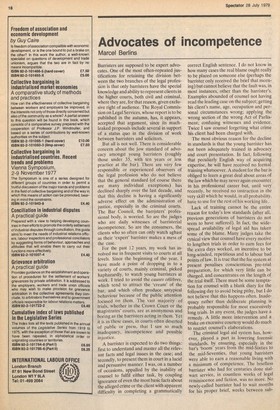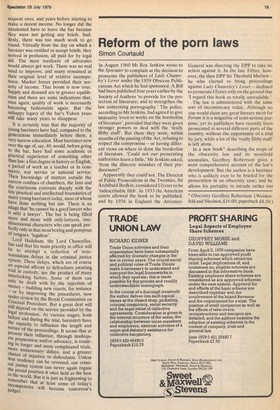Advocates of incompetence
Marcel Berlins
Barristers are supposed to be expert advocates. One of the most often-repeated justifications for retaining the division between the two branches of the legal profession is that only barristers have the special knowledge and ability to represent clients in the higher courts, both civil and criminal, where they are, for that reason, given exclusive right of audience. The Royal Commission on Legal Services, whose report is to be published in the autumn, has, it appears, accepted that argument, since its. muchleaked proposals include several in support of a status quo in the division of work between barristers and solicitors.
But all is not well. There is considerable concern about the jow standard of advocacy amongst young barristers (roughly those under 35, with ten years or less practice at the bar). There are very few responsible or experienced observers of the legal profession who do not believe that the general standard (of course there are many individual exceptions) has declined sharply over the last decade, and that this decline is having a significantly adverse effect on the administration of justice, especially in the criminal courts. The Bar Council, the barristers' professional body, is worried. So are the judges who are daily witnesses of barristerial incompetence. So are the consumers, the clients who so often can only watch aghast as their 'expert' barrister makes a mess of the case.
For the past 12 years, my work has involved me in frequent visits to courts at all levels. Since the beginning of the year, I have made a point of dropping in to a variety of courts, mainly criminal, picked haphazardly, to watch young barristers at work. I tried to avoid the causes cdlebres, which tend to attract the `cream' of the bar, and which often produce untypical behaviour because of the public attention focused on them. The vast majority of trials, whether in the Crown Court or the magistrates' courts, are as anonymous and boring as the barristers acting in them. Yet it is in these cases, in courts often deserted of public or press, that I saw so much inadequacy, incompetence and possible in justice.
A barrister is expected to do two things: first to understand and master all the relevant facts and legal issues in the case; and secondly, to present them in court in a lucid and persuasive manner. I was, on a number of occasions, appalled by the inability of counsel to fulfil either task, by coupling ignorance of even the most basic facts about the alleged crime or the client with apparent difficulty in completing a grammatically correct English sentence. I do not know in how many cases the real blame ought really to be placed on someone else (perhaps the barrister only received the brief that morning) but cannot believe that the fault was, in most instances, other than the barrister's. Examples abounded of counsel not having read the leading case on the subject; getting his client's name, age, occupation and personal circumstances wrong; applying the wrong section of the wrong Act of Parliament; confusing witnesses and evidence. Twice I saw counsel forgetting what crime his client had been charged with.
The most obvious reason for the decline in standards is that the young barrister has not been adequately trained in advocacy and court presentation. In fact, following that peculiarly English way of acquiring expertise, he will have received no formal training whatsoever. A student for the bar is obliged to learn a great deal about areas of the law which he may never again encounter in his professional career but, until very recently, he received no instruction in the very skill which he would, in all probability, have to use for the rest of his working life.
Lack of training cannot be the entire reason for today's low standards (after all, previous generations of barristers do not seem to have suffered). In fact, the widespread availability of legal aid has taken some of the blame. Many judges take the cynical view that counsel have every motive to lengthen trials in order to earn fees for the extra days worked, an incentive to be long-winded, repetitious and to labour bad points of law. It is true that the fee system at present penalises conscientious pre-trial preparation, for which very little can be charged, and concentrates on the length of the trial itself. There must be some temptation for counsel with a blank diary for the following day to avoid being pithy, but I do not believe that this happens often. Inadequacy rather than deliberate planning is probably responsible for most excessively long trials. In any event, the judges have a remedy. A little more intervention and a brake on excessive courtesy would do much to restrict counsel's elaborations.
The criminal legal aid system has, however, played a part in lowering forensic standards, by ensuring, especially in the bar's `boom' years from the mid-Sixties to the mid-Seventies, that young barristers were able to earn a reasonable living with a minimum of competence. The briefless barrister who had for centuries done stalwart service, in countless works of legal reminiscence and fiction, was no more. No newly-called barrister had to wait months for his proper brief, weeks between sub sequent ones, and years before starting to make a decent income. No longer did the untalented have to leave the bar because they were not getting any briefs. Suddenly, there was too much work to go round. Virtually from the day on which a barrister was entitled to accept briefs, they arrived in profusion, all paid for by legal aid. The most mediocre of advocates would always get work. There was no real need to improve, and many remained at their original level of relative incompetence. Market forces provided their security of income. That boom is now over. Supply and demand are in greater equilibrium and there are some indications that, once again, quality of work is necessarily becoming fashionable again. But the unhappy legacy of the bar's Yukon years Will take many years to disappear.
It is certainly true that the majority of Young barristers have had, compared to the generations immediately before them, a very narrow education. Most barristers now ever the age of, say, 40, would, before going to the bar, have had some academic or Practical experience of something other than law: a first degree in history or English, a period of work as a teacher or in commerce, war service or national service. Their knowledge of matters outside the narrow confines of chambers, the Inns and the courtroom contrasts sharply with the tiny Practical and intellectual boundaries of many young barristers today, most of whom have done nothing but law. There is an adage that 'he cannot be a good lawyer who is only a lawyer'. The bar is being filled more and more with only-lawyers, onedimensional characters who can speak perfectly only in that most boring and pompous of tongues, 'legalese'. Lord Hailsham, the Lord Chancellor, has said that his main priority in office will be to attempt a reduction of nearscandalous delays in the criminal justice system. These delays, which are of course an especial affront to defendants awaiting trial in custody, are the product of many interlocking factors. Some of them can only be dealt with by the injection of money — building new courts, for instance — or by improving the procedures, now under review by the Royal Commission on Criminal Procedure. But a great deal will Still depend on the service provided by the legal profession. At various stages, both before and during the trial, barristers have the capacity to influence the length and nature of the proceedings. It seems that at present their influence, through inadequate preparation and/or advocacy, is resulting in longer and more complicated trials, more unnecessary delays, and a greater chance of injustice to defendants. Unless that tendency can be reversed, our criminal justice system can never again regain the proud position it once held as the best in the world. But it is just as frightening to remember that at least some of today's Incompetents will become tomorrow's judges.







































 Previous page
Previous page